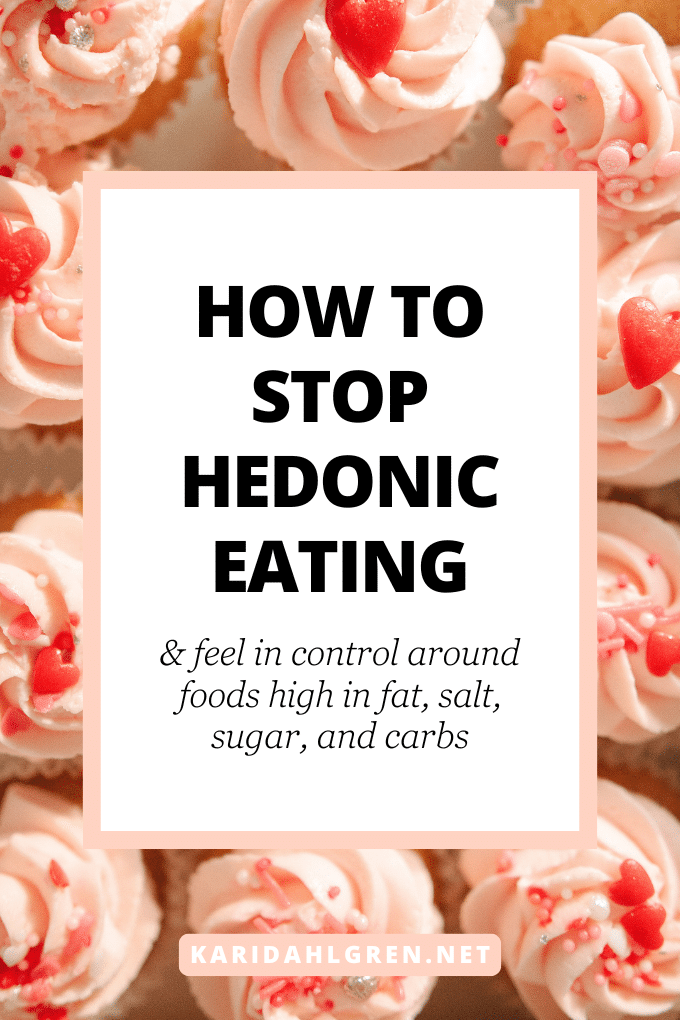
Hedonic eating is the act of eating for pleasure rather than physical hunger. It involves hyperpalatable foods—those high in fat, sugar, salt, or refined carbs—that are particularly hard to resist. Ever find yourself craving something sweet after dinner? If you’re already full but still reach for dessert, that’s hedonic eating in action.
But eating for pleasure isn’t always that simple. As an eating psychology coach, I’ve seen how easy it can be to assume that overeating is just about craving something tasty when, in reality, it can be a subconscious response to uncomfortable emotions like stress, boredom, or sadness. Understanding this nuance is key to making peace with food—without guilt, restriction, or shame.
In this guide, we’ll explore the science behind hedonic eating and hedonic hunger, backed by clinical research. We’ll also break down practical strategies for navigating hedonic eating and the urge to eat for pleasure in a way that supports both satisfaction and well-being.
What Is Hedonic Eating?
The root word of “hedonic” is “hedon,” which comes from the Greek word hēdonē, meaning “pleasure” or “delight.” Therefore, hedonic eating is the act of eating for pleasure rather than for hunger or true caloric needs.[1] Think of the satisfying crunch of potato chips or the velvety smoothness of chocolate—foods that are rich in flavor, texture, and often calories.
Keep in mind that eating for pleasure isn’t a bad thing. In fact, a scoping review of 110 studies found that eating pleasure is linked to better food choices, healthier portion sizes, and a greater appreciation for nutritious foods.[2]
The research also suggests that strategies like mindful eating, cooking enjoyment, and savoring flavors can help create balanced, sustainable eating habits. Recognizing this, countries like Canada and Brazil have even included eating pleasure in their national dietary guidelines as part of a healthy diet.
If eating for pleasure has benefits, why focus on stopping it? The answer is balance. Hedonic eating, when practiced with awareness, can support healthy habits. But when it consistently overrides physical hunger and fullness, it can contribute to poorer health outcomes.
This article explores eating for pleasure when it becomes compulsive—when hedonic eating goes beyond nourishment and turns into a cycle of seeking pleasure at the expense of well-being.
Understanding Hedonic Eating: 5 Evidence-Based Reasons Why We Eat for Pleasure
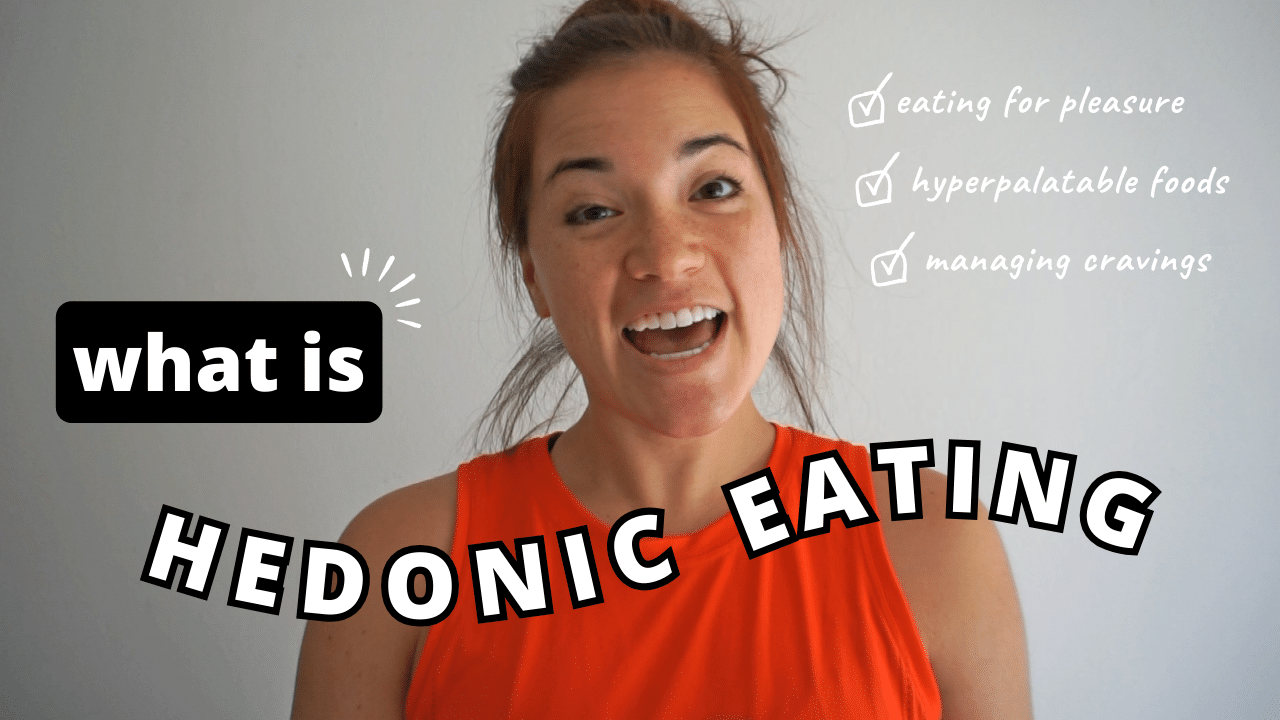
In my YouTube video above, I discuss what hedonic eating is and, more importantly, why you don’t need to feel powerless to food addiction. Although hedonic foods have been shown to possesses addicting qualities—the phenomenon behind the emerging theory of food addiction[3]—eating psychology serves as a powerful and often underrated path forward.
Before we unpack the steps for learning how to stop eating for pleasure, let’s unravel all the reasons why hedonic eating has become a common human experience.
1. Hedonic Eating Is Influenced by Reward Circuitry and Food Addiction
Hedonic eating and the consumption of hyperpalatable foods trigger the release of dopamine, a neurotransmitter associated with pleasure and reward. The dopamine surge after consuming hedonic foods (think: the “sugar high” after eating sweets) reinforces the desire for them and may foster a cycle of compulsive eating.[4]
Hyperpalatable foods can also alter brain areas associated with reward and pleasurable experiences, much like the changes seen in drug addiction.[5], [6] Despite the similarities, food addiction should not be equated with drug addiction due to food’s essential role in survival, making any direct comparison overly simplistic.[7]
Food addiction is a controversial concept with some studies supporting it and other studies stating a need for more evidence.[8], [9], [10] Still, the compulsive behaviors of food addiction include measurable addiction-like behaviors based on the Yale Food Addiction Score, affecting 10-25% of the population.[4] Addiction-like behaviors in eating are a common experience, and increasing awareness helps pave the way towards change.
2. Hormones and Peptides Reinforce the Desire to “Eat For Pleasure”
Hedonic eating is also influenced by certain hormones and peptides. One notable player is ghrelin, often referred to as the “hunger hormone,” which is primarily associated with appetite regulation. Studies reveal that hedonic foods increase ghrelin levels.[11]
As cravings for pleasurable foods heighten, they intensify both physical hunger and emotional hunger, making it harder to distinguish between the two.
Then there’s the endocannabinoid system, a network in the body that helps regulate appetite, mood, and pleasure. Research shows that eating pleasure increases both ghrelin and 2-AG, an endocannabinoid linked to appetite and reward-driven eating.[11]
By amplifying appetite signals, these biological mechanisms can blur internal cues for hunger and fullness, making overeating more likely. This highlights the importance of balance—while eating for pleasure is a valuable part of a healthy relationship with food, maintaining awareness of hunger and fullness helps prevent patterns of overeating.
3. Hedonic Eating Involves Seeking Pleasure and Avoiding Stress
While hedonic eating is strongly linked with pleasure and the desire for a feel-good “dopamine hit,” it’s also influenced by negative emotions like stress. The release of stress hormones like cortisol can alter our food choices, pushing us towards high-reward, hedonic foods as a coping mechanism to alleviate negative emotions and enhance mood.[12]
When we think of emotional eating, we often think of buffering negative emotions with food; but emotional eating can also be motivated by positive emotions.[13] This is where a silver lining surprisingly emerges.
Recent studies show that eating in response to negative emotions correlates with poorer psychological outcomes while eating for pleasure—tied to positive emotions—shows no significant negative impacts.[14]
This highlights that not all emotional eating is harmful. Pleasure-driven eating associated with hedonic habits may carry fewer psychological risks. This also supports the emerging importance of pleasure in healthy eating.[2]
Of course, this applies to pleasurable eating within the boundaries of hunger and fullness. If you struggle with hedonic eating beyond comfortable fullness, like compulsively reaching for dessert after dinner despite feeling full, then it becomes appropriate to learn how to stop eating for pleasure—with the goal of honoring one’s internal body cues.
4. Hyper-Palatable Foods Are Hyper-Available
Another hurdle with hedonic eating is the prevalence and engineered irresistibility of hedonic foods. For instance, McDonalds’ Grand Mac not only boasts 850 calories but also includes 9 grams of unnecessary sugar simply to increase its allure and trigger the brain’s reward circuits.
Neuroimaging studies show that the immediate availability of such high-calorie, hyperpalatable foods significantly boosts their palatability and stimulates brain areas associated with reward and motivation.[15]
Again, while the science behind food addiction is emerging, you don’t need to feel powerless to McDonalds’ golden arches. In my work as an eating psychology coach, I’ve found that understanding and addressing the psychological roots of our eating habits can empower you to say no to even the most tempting foods when you aren’t actually hungry:

Dive deeper into eating psychology: If you relate to hedonic eating, take my quiz to discover your eating psychology strength. Even if you constantly feel tempted around hedonic food, we all have a strength—and I would love to help you build upon yours.
5. Dieting Doesn’t Work—It Only Amplifies Hedonic Hunger
Attempting to resist hedonic foods to learn how to stop eating for pleasure seldom works. Restriction induces a sense of scarcity and deprivation, triggering biological and psychological responses that ironically increase craving for high-calorie, hyperpalatable foods.
This goes to show that even when we try to control our eating, a powerful brain response to pleasurable foods often dominates. It’s no wonder that managing eating habits through restraint alone is difficult, especially in the long run. Sustainable strategies need to go beyond self-control, focusing instead on balance, satisfaction, and attunement to internal cues.
How to Stop Eating for Pleasure: Psychology Holds the Cure for Hedonic Eating
While hedonic hunger and food addiction are biological phenomena, there are powerful psychological undercurrents that, when carefully redirected, can help pave the way towards balanced eating. Restricting hyperpalatable foods clearly doesn’t work, so let’s dive into some tips rooted in eating psychology.
Here are some evidence-based steps for learning how to stop eating for pleasure:
Cultivate Joy and Pleasure Beyond Food
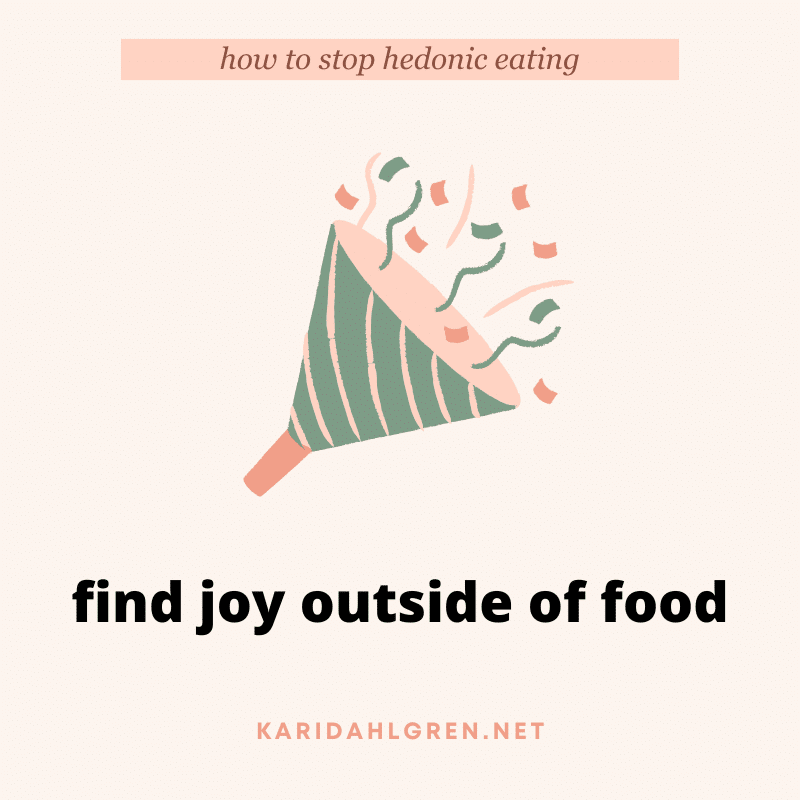
Hedonic eating often stems from a desire to experience pleasure and satisfaction. When joy and life satisfaction are lacking, it can increase the likelihood of turning to food for happiness.
To learn how to stop eating for pleasure—while still recognizing that eating pleasure is a natural and important part of a healthy relationship with food—it’s important to nurture pleasure elsewhere in your life outside of food.
One small study found that higher life satisfaction correlated with reduced consumption of commonly craved foods.[17] By actively nurturing activities, relationships, and experiences that bring you joy, you can reduce the tendency to use food for emotional fulfillment.
Normalize Hedonic Foods to Diminish Their Allure
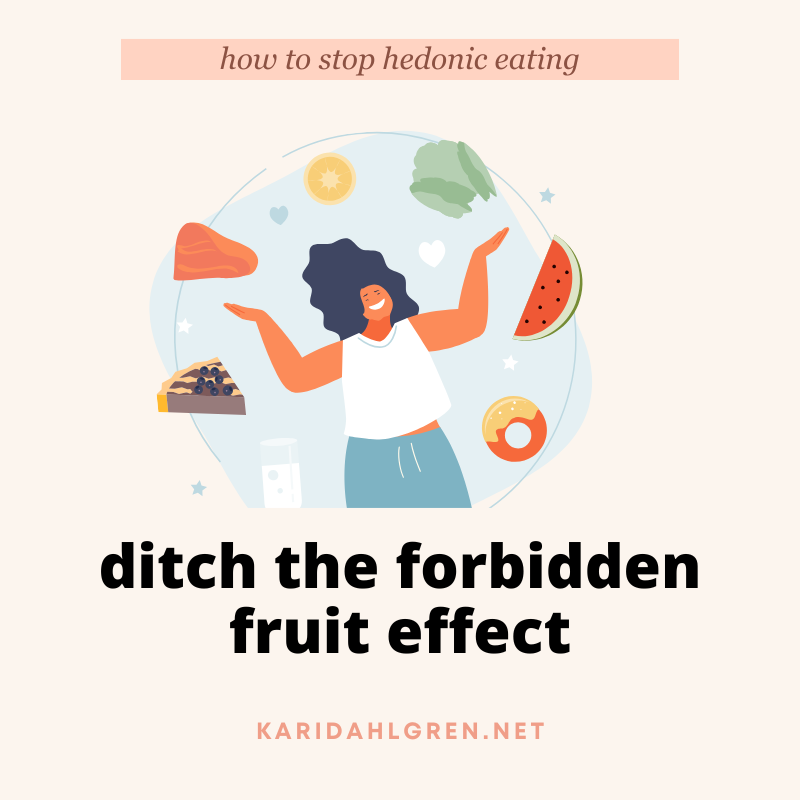
Eating pleasure is a healthy eating recommendation[2] and all foods truly can fit into a balanced diet, even a Grand Mac at times. A problem emerges, however, when we place hyperpalatable foods off-limits, which increases the time we spend thinking about them, and it makes us crave them even more.[18]
Have you ever been there, placing sweets off-limits only to think about them more often—like after lunch, during the 2pm slump, and every single minute between dinner and bedtime? This is the reverse psychology of restriction, and it can be equally effective when flipped on its head. When all foods are allowed, it diminishes the “forbidden fruit” allure of hedonic foods.
If you’re afraid of gaining weight by allowing yourself to eat the foods that you enjoy, see my YouTube video below:

Do you believe that your weight can stabilize if you eat when you’re hungry, enjoy the foods that truly appeal to you—even if they’re hyperpalatable—and stop when you’re full? Research support this (see: set point weight theory) but of course, stopping when you’re full can be difficult when compulsive eating or emotional eating are at play. The next step will address this hurdle.
Address the Root of Emotional Eating
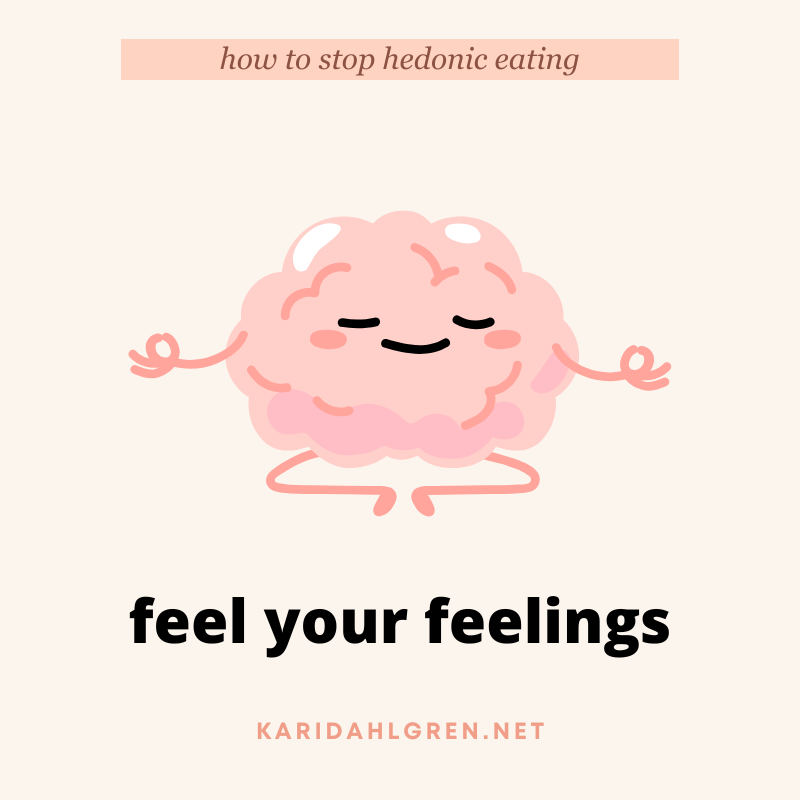
If you’re eager to learn how to stop hedonic eating because you frequently eat past fullness—and even though you know eating pleasure is an important aspect of eating, you also acknowledge that overeating is a problem—my Stop, Drop, & Feel®️ technique can help.
To use this technique, identify the moment you want to eat hedonic foods beyond fullness and briefly step away. Promise yourself that you can continue eating after the Stop, Drop, & Feel if that’s what you truly want. This removes any sense of restriction, helping to prevent the restrict-binge cycle. Then, drop into whatever feelings arise without judgment, allowing yourself to fully experience them.
By training in sitting still with uncomfortable emotions, you develop emotional tolerance, the ability to withstand discomfort without reaching for a buffer.
Emotional tolerance is a skill associated with reduced overeating tendencies.[19]
When you strengthen your ability to handle discomfort, food becomes less of a go-to coping mechanism. Whether you’re eating in response to stress or for pleasure alone, if you’re reaching for hedonic foods without hunger, the key isn’t just self-control—it’s emotional self-regulation. Harnessing this skill can help shift the pattern, allowing you to experience eating pleasure without feeling trapped in a cycle of overeating.
It’s a psycho-spiritual journey: Eating psychology is powerful, and learning how to stop hedonic eating can be a spiritual journey. Learn more in my free ebook, The Spiritual Seeker’s Guide to Stop Binge Eating.
Identify Any Limiting Beliefs Around Food
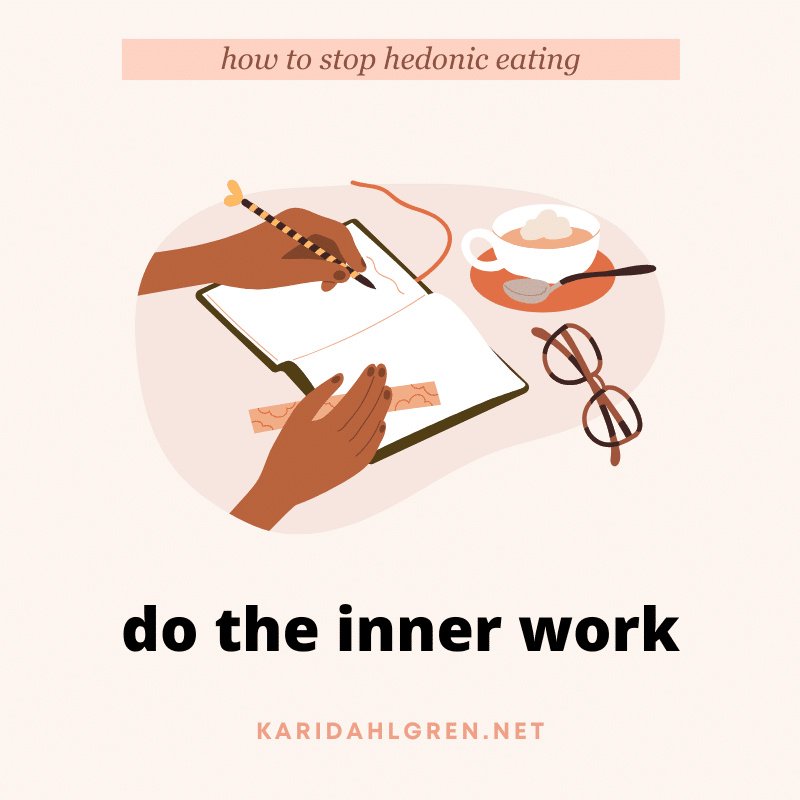
The next step for learning how to stop hedonic eating is to explore any subconscious limiting beliefs that might be standing in the way. If you’ve ever felt powerless around certain foods or thought, Once I start, I won’t be able to stop, those beliefs can create a self-fulfilling cycle. When we assume we have no control, we act accordingly.
This is where self-inquiry becomes a powerful tool. By identifying and challenging limiting beliefs, you can disrupt patterns of compulsive eating at their core. My workbook, Why We Do the Things We Do, is designed specifically for this process.
Through guided self-inquiry, you’ll discover the subconscious narratives that trigger self-sabotage around food—including surprising insights, like how overeating can feel protective in ways you may not even realize. At first, this idea might seem counterintuitive—how could something so frustrating be serving you? But when you dig deeper, you may be shocked at what you discover. And when you understand the hidden forces behind your eating habits, you gain the power to change them.
Navigating Hedonic Eating: A Path to Balanced Pleasure
Remember, hedonic eating isn’t inherently bad. In fact, eating pleasure plays an important role in a healthy, sustainable relationship with food. The goal isn’t to eliminate enjoyment but to bring awareness to when eating for pleasure begins to override internal cues—leading to patterns that feel compulsive or difficult to control.
Breaking free from hedonic eating that extends beyond fullness isn’t about willpower or restriction. It’s about understanding why the urge is there in the first place. Whether it’s emotional eating, limiting beliefs, or a simple lack of non-food-related pleasure, self-inquiry and emotional regulation are key to shifting the cycle.
If finding balance with food feels like a struggle, you don’t have to navigate it alone. My free resources below can help you take the next step toward eating with more ease—so pleasure and nourishment can coexist without the stress.

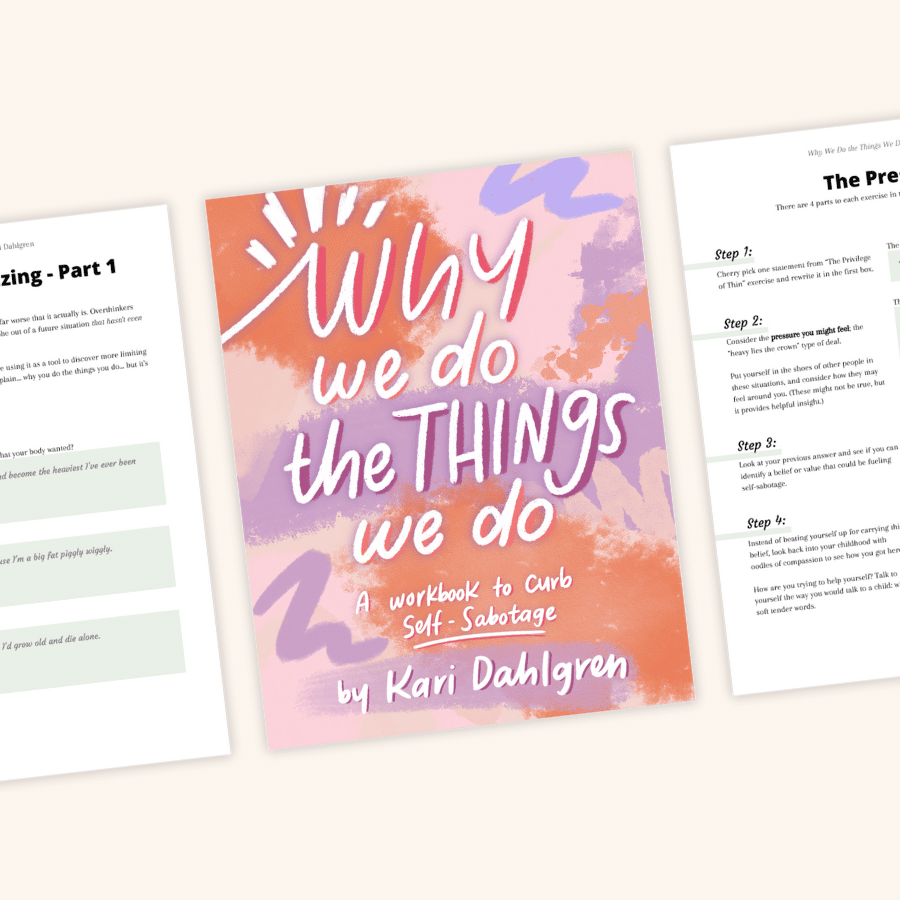
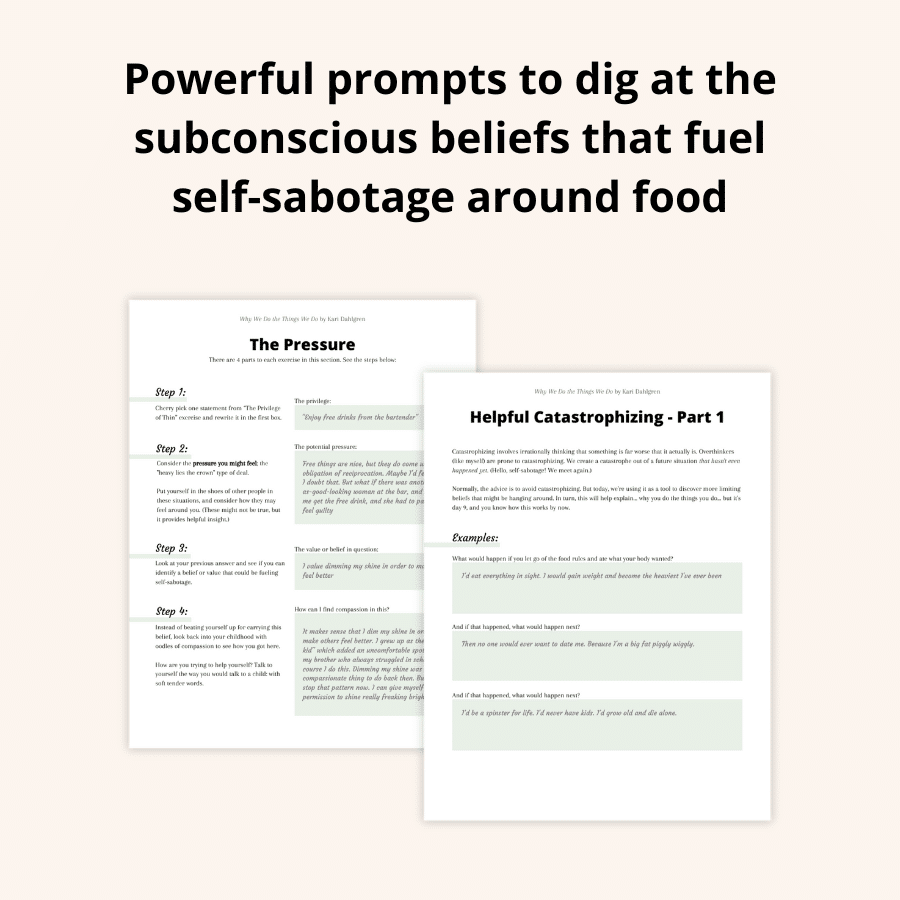



Hello! I’m a binge eater. Overweight, diets not working. I k ow what to do to loose but wont do it. Call it menopause, divorce, depression – what ever – I’m still sick and tired of this weight. I do fine at home it’s when I visit my daughter, mother or at work! I can’t say no to mom, and I stress eat at work.
Thank you for your articles, I’m hoping to change my mind set.
Hi Sandra! Thanks for sharing your story. I think a lot of people can relate to you!! I’d like to hone in on one thing you said here, in case it helps others. Not being able to say no to mom seems like a boundary issue, or an emotional tolerance issue. If you have a loving relationship with your mother, then she should be OK if you say, “No thanks, I’m full. But I love you. Thanks for offering.” If you can’t say that, get curious about why. Is it guilt? Is it shame? Then, can you make space for that feeling? Can you hold space for the discomfort? Also, try having an open conversation with her about how you feel about food. I hope this helps!! xoxo
This does not work at all! Letting yourself have the food leads to binging, plain and simple. Just because it may have worked for you doesn’t mean it works for others. I gained over a hundred pounds by letting myself have unrestricted access.
Thanks for sharing Hayley. I’m sorry things are rough right now. I hope you’re familiar with the eating guidelines and the Stop, Drop, and Feel. Psycho-Spiritual Wellness is a system. Hopefully you’re not cherry picking the permission part and leaving the rest behind. I don’t encourage unrestricted access and that’s all. There’s a lot more that goes into it. Sending you best wishes.
This is so helpful! I’ve been searching for years for something that makes sense and when I read the part about hedonistic eating it made totally sense! I’ve struggled for over 10 years to understand why I eat the way I do and why i pick specific food. I can definetely relate to the need to create joy and I’ve applied for the ebook. Thank you for writing this you have no idea the impact and I’m so grateful x
Thank you so much Kelly! I am sooo glad it helps!
me right now finishing my box of cake while reading this…
No judgment here! I’m sure so many people can relate!
I’m finding your insights extremely helpful right now! I’ve tried to be more aware of the feelings, tried not to numb them, and have NOT had to go to stretch pants during this pandemic. Thanks you!
Thanks so much Gale! I’m soooo happy to hear about your progress!! Keep it up 🙂
Hi Kari. I’m loving your content and would love to follow you on IG. However, I don’t get to find your account. Do you have one? How can I find you over there? 🙂
Hi Macarena! Thanks so much for the love! Sadly, I don’t have an IG account for Psycho-Spiritual Wellness. You can catch me on YouTube or, for the best stuff, my Tuesday Newsletters. <3
My dear Kari,
Thank you for changing my life!
After all these years of binge and emotional eating, your articles and the way you justify every subject under discussion, sweetened my sadness and frustration. Your way of thinking is a gift for me.
Stop ,Drop and Feel then !
Thank you,
I wish you all the best.
Love,
Maria.
Hello Maria! Thank you for this beautiful comment. I am glad you’re here! And I hope the SDF continues to help. Keep me posted on your progress!
Kari, thanks for this great article. I had never considered that I might need to find more sources of joy in my life in order to stop overeating. That’s a really fresh take that makes a lot of sense.
Thanks for the comment Shoshana! I hope you’re able to find your joy and get lots of it 🙂
Hi, I’ve been trying to think of what brings me joy, and it’s love. I love my children, and watching them enjoy life brings me joy. I took my daughter to Boston, and took plenty of pictures of her having a good time exploring. Unfortunately, the entire time, I was thinking about food. I wanted to get ice cream. I didn’t do it, but I gazed longingly at every ice cream shop. We ended up stopping for milk tea and I had a frozen avocado milk tea that was pretty much a milk shake. I wanted to stop at every restaurant. I want to put food in my mouth ALL THE TIME even when I’m not hungry. I try to drink a lot of water, and I chew gum, and I get hot beverages like tea, that I can sip on for awhile. I would really like to not have this urge though. It’s eating just because I want the taste of food in my mouth. And it persists even when doing the things that bring me joy.
Hi Angela! I’m sorry to hear about the incessant food noise going on in your head. I’ve been there, and it’s not fun. My recommendation (unsolicited, since you didn’t pose a question, but I can’t help myself) is to focus on the Stop, Drop, and Feel. Since you know what your joy is, then the next step is to look at the feelings that drive the compulsive thoughts around food. I hope this helps!
Hi Kari, Finally! I love your program, wisdom, and approach. I’m 67 and I have been crazy around food for my entire life. Not feeling/eating and hedonic eating have been my MO. Now I’m asking myself what am I trying not to feel right now when I want food and I’m not hungry. It works! I find honoring my body and listening to what it wants, I’m drinking less coffee and wine and more water, I’m taking better care of myself and I’m learning about me every day. Thank you from the depths of my soul.
Thank you Thia 🙂 I really appreciate your kind words, and I am sooo glad you’re gaining all this wonderful insight into yourself. What a gift!! I hope it continues to go well for you. xo
I am really getting so much out of your content. I’ve tried “mindful eating” before and it didn’t work for me. Your approach makes so much more sense. It’s the emotional component that was missing for me. Also, the hedonistic eating concept really resonates with me. I can see how food is filling that “hole” in my busy life. I totally feel like I’ve been getting skunked out of the good things in life. Wow. I may have mentioned in a comment somewhere else before, but I’m in my late 50’s and have never heard such a simple, direct, and thoroughly explained way that makes total sense. I know, easier said than done. However, I got rid of all my diet stuff and I am all in. Thanks so much!!
Hi again Dolores! Thank you sooo much for your kind words. I’m so glad you’re getting good use from the content 🙂 Hurray for being all in! I hope you’ll reply to one of my emails sometimes so that we can connect even more. xo
I find this very intriguing and I hope I can make it successful.
I want to know how one knows when they’re full? When it’s enough? I can eat non stop.
Thank you for the food for thought.
Hi Brenda! Great question. Can you tell when you’re physically full? Even if you can keep eating, is there a point when you know you’ve physically had enough? If not, don’t worry. For many of us, it takes time to get back in touch with hunger/fullness. Don’t give up and keep trying to lean into your intuition <3
What happens when you are unable to identify what drives the urge to eat? Or, worse yet, name something that brings joy?
Such a deep comment! Sometimes there are other emotions underneath the joy, like fear. When many of us experience joy we may also experience fearful thoughts like ‘it’s only a matter of time before the other shoe drops.’ I’d love to know if this resonates with you or not <3
Hey Kari – this one really spoke to me. Just discovered you can *bake your own bread* and then eat it warm from the oven?!?!? Talk about eating past fullness and definitely hedonic eating going on. Thanks to your quizzes, I know this is my binge style, so this article was quite timely. I’m currently making a list of all the other “hedonic” things I enjoy doing and am going to start doing one a day and see what happens. So much appreciation for your good work!
Yeeeessss Molly!!! So good!! I love that you’re making a list of other non-food things that bring you joy 🙂 keep me posted! I want to hear how it goes. And I hope you’ll continue to enjoy the warm bread when you’re hungry. It sounds too good to stop! xo
Kari, this blog is another one of the 10,000 reasons why I love you so much. You are speaking to my SOUL with this one. I actually shared it with several family members too. Thank you, thank you.
Yeeeeessss!! Thank you Shannon! It is so good to hear from you!! To any of Shannon’s family members perhaps reading this, hey hi hello ^_^
Hi! I was diagnosed with depression and anxiety a year and a half ago. Before then, I was in the best shape of my life and really thriving. As soon as my depression hit, it was over. I gained and gained because I simply tried desperately to feel something. I am and have been medicated since, but my eating is the only thing really dragging me down. I’ve been trying loose meal prep with lots of vegetables and it’s improved for sure. I found this and it helped me even further to understand what’s going on with me. Thank you for your time and effort in sharing this for us. I appreciate you.
I am so glad this was helpful Tyrone! Self-understanding can pave the way for so much healing, and it means a lot to me to be able to provide that. Keep on 🙂
Here’s a challenge for you!
I’m 66 and have called myself a “chocolate alcoholic “ for my whole life. I know I’m a Hedonic / Emotional eater. I’ve tried it all. Changing my life, dieting , which included cutting out sugar and alcohol. Not dieting but changing to a healthier way of eating yet still allowing my goodies on occasions . But once I tasted it, it was over! I did a healthy keto diet for a year with a company that supplied a coach, temporary additional food, and all the journaling and measuring both food and body. They taught me about all the things to do so not to self – sabotage. Including something similar to your SDF. I was so happy ! I lost all my weight ! Even on a bad day when I would be crying, I’d look in the mirror and I’d start smiling and my whole mood would change because I saw me …thin.! Finally! The downside was that I had to stay away from my social life and I spent all my time from spring till the end of the summer working in both my kids yards landscaping . I never felt healthier or so fulfilled . My husband who is very , VERY frugal with money , paid out $3,000.00 that year. My A1C was way down, I could put anything on and look good, tie my shoes without gasping for air and men would flirt and open doors. etc… Unfortunately, I eventually gained it all back . I constantly look in the mirror and ask myself why?
I’ve been mentally preparing myself to start again but can’t get myself to begin. Experiencing the joy and satisfaction that year , knowing I was happier than I had ever been in years ,
I realize now that I’m just going to gain it all back …again.
I’ve gone over my emotional issues and not sure what I can do about them. My daughter is a counselor and we’ve had many talks.
Here are my 4 issues that make me sad.
1- My marriage … We are more like 2 room mates. He’s a nice guy but we are so different and think so differently. We just don’t click. But we love each other.
2- I use to live in Hawaii in the sun and now Im stuck in rainy and gray Washington.
3- My parents and my oldest brother have past away. My mom was my best friend, my dad was my Hero! He always made me feel good about myself. And my oldest brother was like a car salesmen but always treated me good until I became the Trustee. He thought he should have been.
4- I don’t see my other 3 brothers anymore. One treated me horribly accusing me of stealing from my dad while I was managing his Trust. My other moved to Florida and we talk about 3x a year. And my baby brother whom I adore, doesn’t talk to anyone. I think it brings up bad memories . He was the co- trustee by my choice.
Altho he will text me Happy Birthday and Merry Christmas.
I’ve been to therapy for my marriage and have come to the conclusion that deep down I’m happier in my situation
( especially since my kids and grandkids live 5 mins away) than if I was all alone, by myself in Hawaii.
So there you have it! Crazy life of mine.
What’s your thoughts? Any advice?
Hi Shari! I think that myself and many others who stumble upon this article can relate to different parts of your story. You have certainly been through a lot!! And I think you answered your own question. So much of your joy has been taken from you, and when we don’t get joy from our lives, it’s natural to seek it through food. So natural and NORMAL. It also sounds like the previous diet you were on was very rigid and restrictive, which usually doesn’t work long-term, and I wonder if it worked for you at the time because your life was teeming with joy, so you were able to make certain sacrifices (like your social life etc). The sacrifices at the time were supported by overwhelming joy in other areas of your life. These are just my thoughts after reading your story. Thanks for sharing 🙂 Feel free to respond to this with any more thoughts, I’m happy to help.
So, I was reading this while finishing a Crumbl cookie that I literally crumbled into some chocolate frozen yogurt…felt super guilty cause why did I have to buy BOTH of them, when I had them BOTH yesterday too. Anyways, then I did the “Self-Sabotage Inducing Benefit” exercise from the “Spiritual Seekers Guide to Stop Binge Eating” PDF, where I asked my fat why it was here, and HOLY SHT… I did NOT realize I was feeling all of these feelings…it was really an eye opener. I’ve been getting Kari’s emails for a while and I always like what she has to say in them, but I never really put the SDF to use. But after doing this exercise, I will definitely be using the SDF now as there are A LOT of feelings going on in my life, especially lately, and so naturally, the binge eating/general over-eating has been rampant. And as a very spiritual person with a degree in psychology, I really do relate/find truth in a lot of Kari’s work, just haven’t been putting it to use. But I will now. I highly suggest doing this exercise and just let the “fat” talk, you might be very surprised with what it says…
Thank you so much for the beautiful comment, Sam! The Crumbl cookie with frozen yogurt sounds SO relatable, and I’m sure I’m not the only one who feels that way. I count myself lucky to have readers like you — so willing to dig deep. It truly takes courage to put pen to paper and face these parts of ourselves head-on. I’m tipping my hat to you! And I’d love to hear any future updates you feel called to share 🙂
I am someone who struggle with overeating, emotional eating etc from a very young age, at first I try to ignore it, then a time came when my physician said, you are overweight, that when it hit me that I need to let go of this habit for a happier life
Then I enrolled in fitness class and could take this habit under control for months before snapping and go back to square one
I tried everything, watched videos to help me but no matter what I couldn’t stop it
Even after being full, I will reach for a snack and eat them to a point where it makes me uncomfortably full and I couldn’t move my body properly
And today I came across this blog and I am giving it a try,I hope this will help but the last part where allowing one to eat after this technique is making questions it’s credibility because as someone who can’t stop it ones I start I think it will do me more harm than good
Hi L! Thank you so much for sharing your story. It is clear that you have a lot of determination. I completely understand your hesitation about the element of permission with the Stop, Drop, & Feel. The cycle of overeating often gets stronger the more we try to control or suppress it. For many of us, we’re going to eat the food either way. But with the SDF, we’re at the very least building emotional self-regulation skills in the process — and those skills help address the root of emotional eating over time. But if your intuition is saying this won’t work for you, then honestly listen to that, and seek support from someone you trust, like a coach, therapist, or registered dietitian. You don’t have to walk this journey alone, and it’s important to listen to your intuition. When it comes to making changes, I like to follow the motto: feel challenged but not overwhelmed. You don’t want to embark on a journey feeling skeptical. You want to start with trust, faith, and an inner knowing that these steps align with your values. I hope this helps!